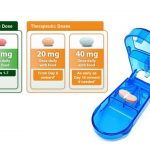The Truth About Trintellix: Frequently Asked Questions (FAQs)

What is Trintellix?
Trintellix manufactured by Takeda Pharmaceuticals U.S.A is a brand of vortioxetine used to treat depression. It works by helping to restore the balance of a certain natural substance (serotonin) in the brain. Trintellix is an SSRI (selective serotonin reuptake inhibitor) and serotonin receptor modulator. This medication may improve your mood, sleep, appetite, and energy level and may help restore your interest in daily living.
What are the ingredients in Trintellix?
Active ingredient: vortioxetine hydrobromide
Inactive ingredients: mannitol, microcrystalline cellulose, hydroxypropyl cellulose, sodium starch glycolate, magnesium stearate, and film coating consisting of hypromellose, titanium dioxide, polyethylene glycol 400, iron oxide red (5 mg and 20 mg), and iron oxide yellow (10 mg)
How does Trintellix work?
Trintellix is an effective antidepressant that works to balance the neurotransmitter serotonin in the brain. Trintellix also inhibits the reuptake of the norepinephrine transporter in the brain. Due to its unique abilities and effect on the brain, many individuals find success with treating their depression with Trintellix when they have failed to benefit from other antidepressants.
What is the most important information I should know about Trintellix?
Trintellix and other antidepressants may increase suicidal thoughts and actions in some people 24 years of age and younger, especially within the first few months of treatment or when the dose is changed. Trintellix is not for use in children under 18.
Depression or other mental illnesses are the most important causes of suicidal thoughts or actions. Some people may have a particularly high risk of having suicidal thoughts or actions. These include people who have (or have a family history of) bipolar illness (also called manic-depressive illness) or suicidal thoughts or actions.
How can I watch for and try to prevent suicidal thoughts and actions?
Pay close attention to any changes, especially new or sudden changes in mood, behavior, thoughts, or feelings.
Call your healthcare professional or get emergency help right away if you have symptoms such as suicidal thoughts or actions, impulsivity, aggressive or violent actions, depression, anxiety or panic attacks, agitation, restlessness, anger, irritability, trouble sleeping, an increase in activity or talking, or other unusual changes in behavior or mood; especially if they are new, worse, or worry you.
Keep all follow-up visits with your healthcare professional as scheduled. Call your healthcare professional between visits as needed, especially if you have concerns about symptoms.
Call your healthcare professional or get emergency help right away if you have symptoms, especially if they are new, worse, or worry you.
- Attempts to commit suicide
- Thoughts about suicide or dying
- Feeling agitated, restless, angry or irritable
- Other unusual changes in behavior or mood
- Acting on dangerous impulses
- New or worse depression
- Trouble sleeping
- Acting aggressive or violent
- New or worse anxiety or panic attacks
- An increase in activity or talking more than what is normal for you.
What should I tell my doctor before taking Trintellix?
Before taking Trintellix, tell your doctor:
- about all your medical and other health conditions
- if you are pregnant or plan to become pregnant, since Trintellix may harm your unborn baby. Taking Trintellix during your third trimester may cause your baby to have withdrawal symptoms after birth or to be at increased risk for a serious lung problem at birth. Tell your doctor right away if you become or think you are pregnant while taking Trintellix.
- if you are breastfeeding or plan to breastfeed, since it is not known if Trintellix passes into your breast milk
- Tell your doctor about all the medicines you take, including prescription and over-the-counter medicines, vitamins, and herbal supplements, since Trintellix and some medicines may cause serious side effects (or may not work as well) when taken together. Especially tell your doctor if you take: medicines for migraine headache called triptans; tricyclic antidepressants; opioids (such as fentanyl and tramadol); lithium; tryptophan; buspirone; St. John’s Wort; medicines that can affect blood clotting such as aspirin, nonsteroidal anti-inflammatory drugs (NSAIDs), warfarin; and diuretics.
How should I take Trintellix?
Take Trintellix exactly as your healthcare provider tells you to take it. Your healthcare provider may need to change the dose of Trintellix until it is the right dose for you.
Take Trintellix 1 time each day.
Trintellix may be taken with or without food.
If you take too much Trintellix, call your poison control center at 1-800-222-1222 or go to the nearest hospital emergency room right away.
Who should not take Trintellix?
Do not start or take Trintellix if you:
- are allergic to vortioxetine or any of the ingredients in Trintellix
- take a Monoamine Oxidase Inhibitor (MAOI)
- have stopped taking an MAOI in the last 14 days
- are being treated with the antibiotic linezolid or intravenous methylene blue
- Do not start taking an MAOI for at least 21 days after you stop treatment with Trintellix.
How long does it take for Trintellix to start working?
• Some effects from Trintellix should be noticed by most people after two weeks of treatment; however, the full effect of Trintellix treatment may not be seen until week 4 or later.
• In one study, 61% experienced a remission of depressive symptoms after 4 weeks of treatment, but for another 15%, it took eight weeks for remission to occur.
• After eight weeks of treatment, effects begin to level off but they persist.
At least five trials of 6 to 8 weeks duration have established the effectiveness of Trintellix (vortioxetine).
Overall, some effect was seen within two weeks which increased over subsequent weeks with the full effect not seen until week 4 or later. After 8 weeks the effects began to level off but the improvement in symptoms persisted.
In a maintenance study of 639 people, approximately 61% satisfied the remission criterion (MADRS total score ≤10) after four weeks of treatment, and 15% satisfied remission criteria after an additional 4 weeks (so eight weeks in total).
People taking Trintellix also experienced a statistically significantly longer time before a recurrence of depressive episodes than those that were taking a placebo (a pretend pill).
What are the possible side effects of Trintellix?
Trintellix may cause serious side effects, including
Serotonin syndrome. A potentially life-threatening problem called serotonin syndrome can happen when you take Trintellix with certain other medicines. Call your healthcare provider or go to the nearest hospital emergency room right away if you have any of the following signs and symptoms of serotonin syndrome:
- agitation
- seeing or hearing things that are not real (hallucinations)
- confusion
- coma
- fast heart beat
- changes in blood pressure
- dizziness
- sweating
- flushing
- high body temperature (hyperthermia)
- shaking (tremors), stiff muscles, or muscle twitching
- loss of coordination
- seizures
- nausea, vomiting, diarrhea
Increased risk of bleeding. Taking Trintellix with aspirin, non-steroidal anti-inflammatory drugs (NSAIDs), warfarin or blood thinners may add to this risk. Tell your healthcare provider right away about any unusual bleeding or bruising.
Manic episodes. Manic episodes may happen in people with bipolar disorder who take Trintellix. Symptoms may include:
- greatly increased energy
- racing thoughts
- unusually grand ideas
- talking more or faster than usual
- severe problems sleeping
- reckless behavior
- excessive happiness or irritability
Discontinuation syndrome. Suddenly stopping Trintellix may cause you to have serious side effects. Your healthcare provider may want to decrease your dose slowly. Symptoms may include:
- nausea
- sweating
- changes in your mood
- irritability and agitation
- dizziness
- electric shock feeling (paresthesia)
- tremor
- anxiety
- confusion
- headache
- tiredness
- problems sleeping
- hypomania
- ringing in your ears (tinnitus)
- seizures
Eye problems (angle-closure glaucoma). Trintellix may cause a type of eye problem called angle-closure glaucoma in people with certain other eye conditions. You may want to undergo an eye examination to see if you are at risk and receive preventative treatment if you are. Call your healthcare provider if you have eye pain, changes in your vision, or swelling or redness in or around the eye.
Low levels of sodium in your blood (hyponatremia). Low sodium levels in your blood that may be serious and may cause death, can happen during treatment with Trintellix. Elderly people and people who take certain medicines may be at a greater risk for developing low sodium levels in your blood. Signs and symptoms may include:
- headache
- difficulty concentrating
- memory changes
- confusion
- weakness and unsteadiness on your feet which can lead to falls
- In more severe or more sudden cases, signs and symptoms include:
- seeing or hearing things that are not real (hallucinations)
- fainting
- seizures
- coma
- stopping breathing (respiratory arrest)
Sexual problems (dysfunction). Taking Trintellix may cause sexual problems.
Symptoms in males may include:
- Delayed ejaculation or inability to have an ejaculation
- Decreased sex drive
- Problems getting or keeping an erection
Symptoms in females may include:
- Decreased sex drive
- Delayed orgasm or inability to have an orgasm
Talk to your healthcare provider if you develop any changes in your sexual function or if you have any questions or concerns about sexual problems during treatment with Trintellix. There may be treatments your healthcare provider can suggest.
The most common side effects of Trintellix include nausea, constipation, vomiting.
These are not all the possible side effects of Trintellix.
Call your doctor for medical advice about side effects. You may report side effects to FDA at 1-800-FDA-1088.
How should I store Trintellix?
Store Trintellix at room temperature between 68°F to 77°F (20°C to 25°C).
Keep Trintellix and all medicines out of the reach of children.
What other general information do I need to know about the safe and effective use of Trintellix?
Medicines are sometimes prescribed for purposes other than those listed in a Medication Guide. Do not take Trintellix for a condition for which it was not prescribed. Do not give Trintellix to other people, even if they have the same symptoms that you have. It may harm them. You can ask your pharmacist or healthcare provider for information about Trintellix that is written for healthcare professionals.





